


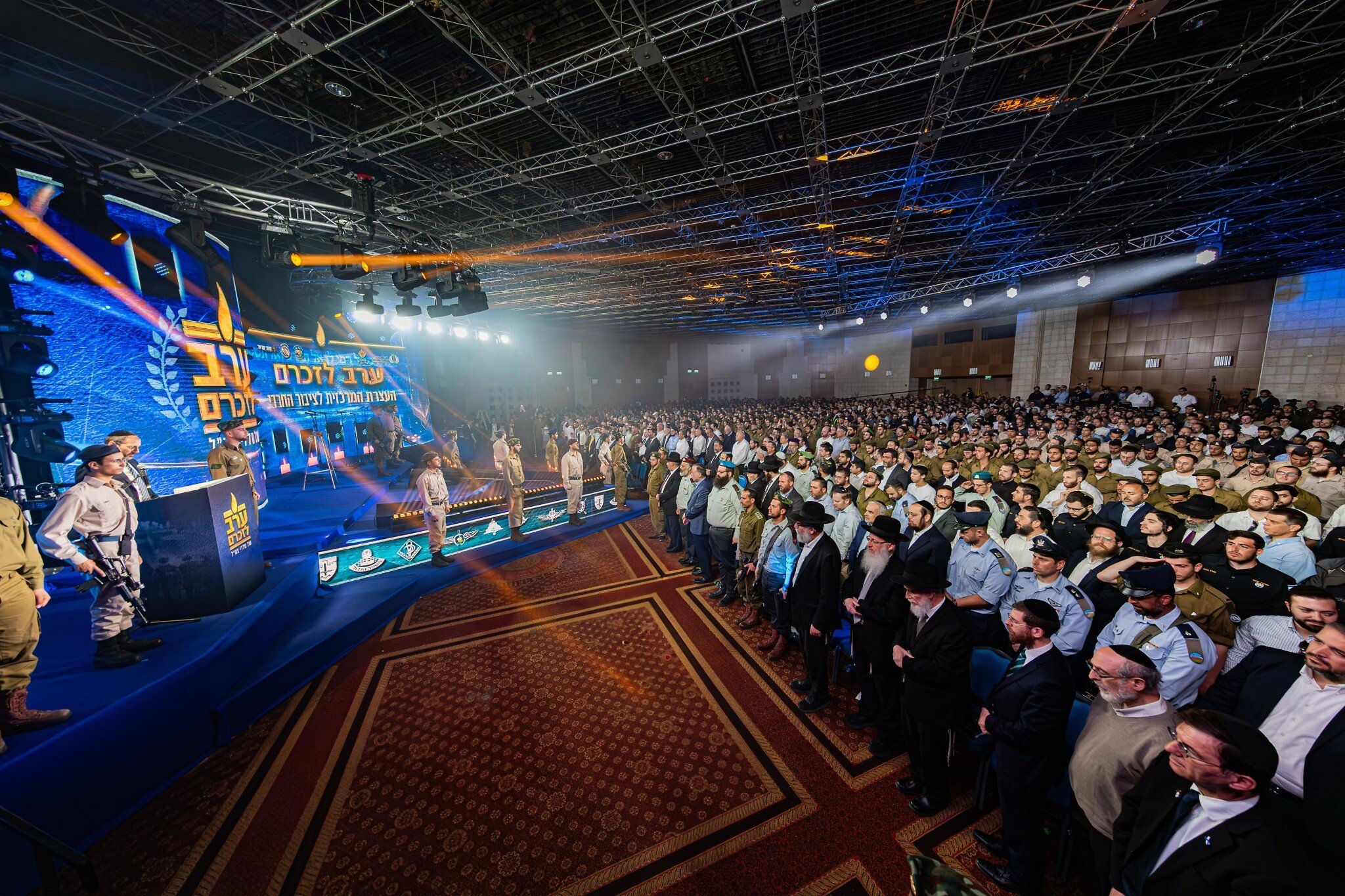
For Liel Kroizer, attending a Memorial Day ceremony was important.
“My husband is in the army, my father served, my brother will enlist next summer,” Kroizer said as she gently rocked the stroller where her eight-month-old baby, her first child, slept.
The young mother spoke with The Times of Israel shortly before Tuesday’s event at the International Conference Center in Jerusalem honoring fallen soldiers who served in ultra-Orthodox tracks within the Israel Defense Forces.
The ceremony was organized by the Netzach Yehuda NGO, together with other groups that facilitate the army service of Haredi men.
It took place against the backdrop of a deep social and political crisis in Israel concerning the Haredim’s place in the country.
As Israel grapples with the longest war in its history, ultra-Orthodox leaders have steadfastly refused to forgo the decades-long blanket exemptions from army duty traditionally afforded to Haredi youth, even after the Supreme Court declared the practice illegal in July.
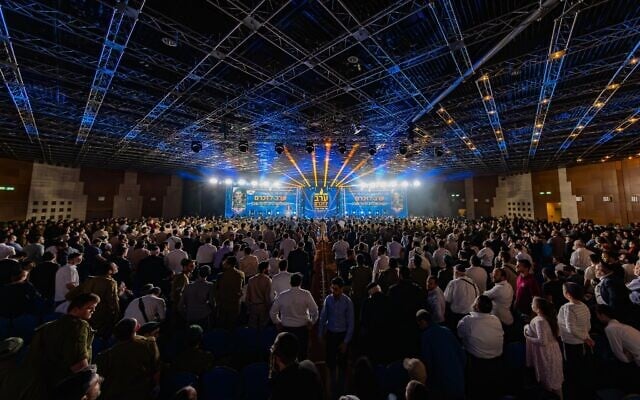
The most extremist groups in the Haredi world have also often staged violent protests against the attempt to draft the ultra-Orthodox, clashing with police and even harassing Haredi recruiters. At the same time, the IDF has sent some 10,000 conscription orders to eligible Haredi men in the past year, but only some 2 percent have complied.
The controversy was only indirectly hinted at during the ceremony.
“Being a Haredi fighter in the IDF means holding a Torah scroll in one hand, and the sword of King David in the other,” said Netzah Yehuda CEO Yossi Levi, speaking from the stage. “This is how we fight, this is our model, this is the example of the people of Israel.”
Over 3,000 people gathered at the venue, including hundreds of soldiers in uniforms, who earlier in the day were also offered the opportunity to attend Torah classes and other special activities.
The event was designed to cater to an ultra-Orthodox audience. Men and women were seated separately, and the musical entertainment was provided by a well-known Haredi singer, Avraham Fried.
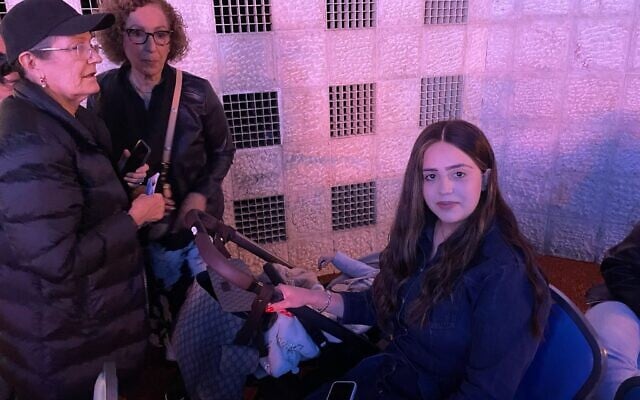
Some of the arrangement though suggested that the organizers had in mind a more modern ultra-Orthodox population compared to the most traditional communities. For example, at the beginning of the ceremony, participants were invited to take out their smartphones and scan a QR code that appeared on the screens behind the stage to receive some Mishna chapters to learn.
Completing the study of the Six Tractates of the Mishna is a long-established way to honor the dead among Jews. At the same time, in many ultra-Orthodox groups, owning a smartphone – much like serving in the army – remains deeply taboo.
Participants who spoke with The Times of Israel denied that they had ever experienced backlash from their communities for their choices. They also insisted that young men who devote their lives to study Torah in a serious way should not be required to serve in the army.
“We live in Bnei Brak,” said Kroizer, whose husband serves in a non-combat position in a media unit. “We never experienced problems related to my husband’s service. We live in a very Haredi community and everyone respects what he does.”
Yitzkah, a soldier serving in the army’s rabbinate who declined to give his last name, said he too always encountered support.
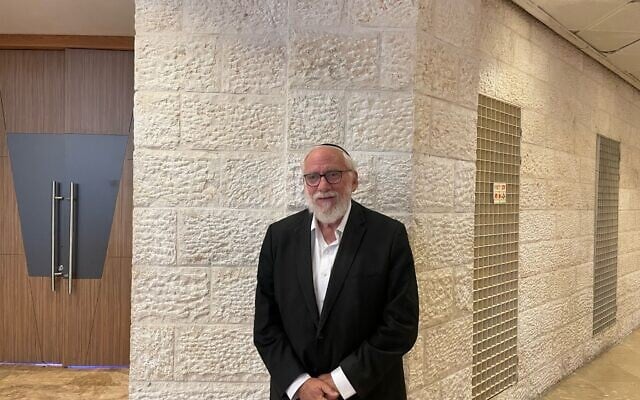
“People around me think it is a good thing,” he told The Times of Israel.
Yitzkah explained he chose to serve because he felt it was important to be part of society. At the same time, he suggested that while he started his service at an older age after studying in yeshiva, enlisting younger and in combat units might be more challenging for Haredi values.
“There is a stigma against serving in the army among Haredim, but I think that if a new framework is proposed where certain conditions are guaranteed, things will change,” Yitzkah said.
While the IDF currently offers several tracks meant for Haredi men, critics have charged that in the past, the army often did not keep its commitments to ensure a full ultra-Orthodox lifestyle for the soldiers.
“It is important for the Haredi community to see that a soldier who enters the army as a Haredi can remain such and still be Haredi as he finishes his service,” Rabbi Motti Kornfeld told The Times of Israel.
A New York native who made aliyah in the 1970s, Kornfeld has been involved in supporting Haredi soldiers in the army for 25 years.
“We are all one family and we should be able to discuss and solve differences as brothers and sisters,” he said, when asked about the current climate around the question of Haredi enlistment.
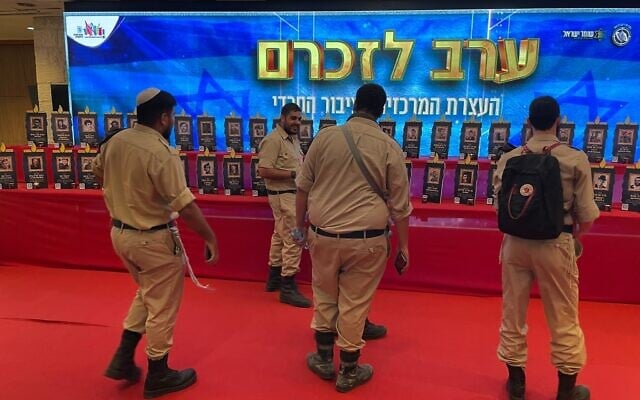
Kornfeld said that while he does not know exactly what it would entail, if all sides are willing to genuinely compromise, a solution can be found (so far, most Haredi representatives in the Knesset and prominent ultra-Orthodox rabbis have insisted on maintaining a system of complete exemptions).
Kroizer also believes a solution can be reached, saying the key is to allow those who study Torah seriously to receive an exemption.
“I am very proud of my husband’s service, I think it is very meaningful,” she said. “People who are not learning must serve in the army, those for whom Torah is their life, who really learn all day, they are our most sacred people.”
Asked why it is so difficult to find a compromise, Kroizer said that “people got use that this is the way it is.” At the same time, she highlighted that she understood and respected the desire of the Torah world to preserve its learners.
“Our soldiers are unbelievable, they have such a love for Israel and for the people of Israel,” echoed Kornfeld. “Just as important, all the boys who are sitting in yeshiva and learning Torah also contribute to the defensive shield of Israel. That’s our worldview. What makes me sad is that both groups can’t seem to find what they have in common.”
Social Affairs Minister Yaakov Margi, a member of the Ultra-Orthodox party Shas, also expressed similar positions.
“The State of Israel is facing challenges on multiple fronts,” he said at the event. “As we witness the events unfolding around us and hear the threats of our vicious enemies who seek our destruction, we must remember our shared destiny.”
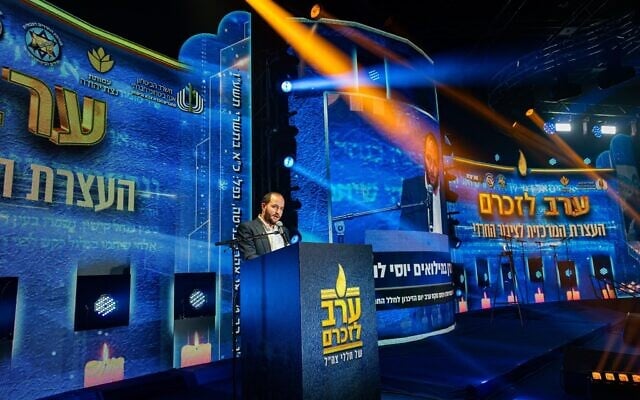
“I commend and support those behind this important initiative to mark the holy Memorial Day for Haredi families in accordance with the path of God and the Torah, and for their efforts to integrate Haredim into the military framework.”
Names of some 50 fallen soldiers were read out loud, while bereaved family members and army representatives recited Psalms and traditional remembrance prayers, such as Yizkor and El Maleh Rahamim.
Rabbi Hananya Peretz, father of Uriel, a soldier in the Kfir Brigade’s Netzah Yehuda Battalion, who fell in battle in the northern Gaza Strip in December, spoke on behalf of bereaved families, sharing memories of his son’s exceptional talent for Talmud, and also his generosity in assisting weaker students.
Among the public, many wore distinctively ultra-Orthodox garments for men, and wigs and dresses for women, but others donned knitted kippas and head coverings more typical of the national religious community. Some secular people also attended the event.
As in all national ceremonies in Israel, the event concluded with the national anthem Hatikva, but was followed by the iconic Ani Maamin (“I believe”) song, a musical rendition of Maimonides’ thirteen-point principles of faith.
The public stood and sang both with full participation.
